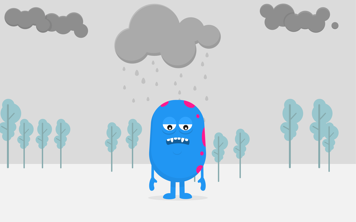Some negative emotions are easier to identify than others. Everyone feels sad, angry or frustrated from time to time. This is completely natural.
Other emotions are harder to identify but can still have a big impact on how you feel and what you do.
Here is a list of different negative emotions that teens feel. Thinking about the stresses you have in your life, choose all the negative emotions that you have felt recently.
- Guilty
- Angry
- Ashamed
- Hopeless
- Sad
- Left out
- Frustrated
- Alone
- Inferior
- Embarrassed
- Humiliated
- Ignored
- Worthless
- Lonely
Why you feel negative emotions

Negative emotions can have many different causes. Maybe you feel bad if you:
- are fighting with a friend or family member
- receive a low grade on a test
- get into trouble with your parents, your teachers or with the law
- are unable to do something fun that you want to do
- feel like others are judging you
Think about some times you have felt sad, angry or frustrated.
For many people, these feelings are not too strong and go away with time. Or, even though they feel negative about some things, they still feel happy and positive about other things.
But for other people, negative emotions can stay around for a long time and can start to interfere with their life.
Negative emotions and pain

Experiencing negative emotions is common in teens who have pain.
As a teen with sickle cell disease, you have many of the same stressful life events as other teens but may experience extra stressors every day because of your condition.
What are some difficulties that you have in your life that are mostly because of your sickle cell disease?
Some common difficulties include:
- missing school because of your sickle cell disease
- missing activities with friends because of your sickle cell disease
- visiting the clinic for blood work
- feeling pain
- going to the emergency department because of a pain flare-up
- having to take medications
- not having a lot of energy
- missing activities with your families and friends
Over time, dealing with the added stress and limitations of sickle cell disease and being in pain can take its toll on how you feel. Any negative emotions you feel may also stay around for longer because of your constant sources of stress.
How negative emotions can affect your behaviour
Negative emotions can have a big impact on what you do and how you act. This is especially true if you are feeling this way for a long time.
Negative emotions can affect your behaviour in lots of ways. Other teens have reported:
- trouble sleeping
- changes in appetite
- not wanting to do anything
- trouble concentrating
- having no energy
- not wanting to talk to friends or family
- forgetting things
- wanting to be alone
- being really irritable
Looking at this list, it might be easy for you to see that a cycle of negative emotions can continue. For instance, if you feel irritable and don’t feel like doing anything with friends, you may feel even more sad and hopeless. This may make you want to be alone even more.
Changing negative emotions

Although negative emotions can have a big impact on our lives, there are things we can do to improve our mood and feel better.
One of the things you can do is to change the way you think about stressors and situations. In the module about stress, you already learned how to replace negative thoughts with positive thoughts to change how you think and feel.
In this module, you will learn two more methods to help you improve your mood: